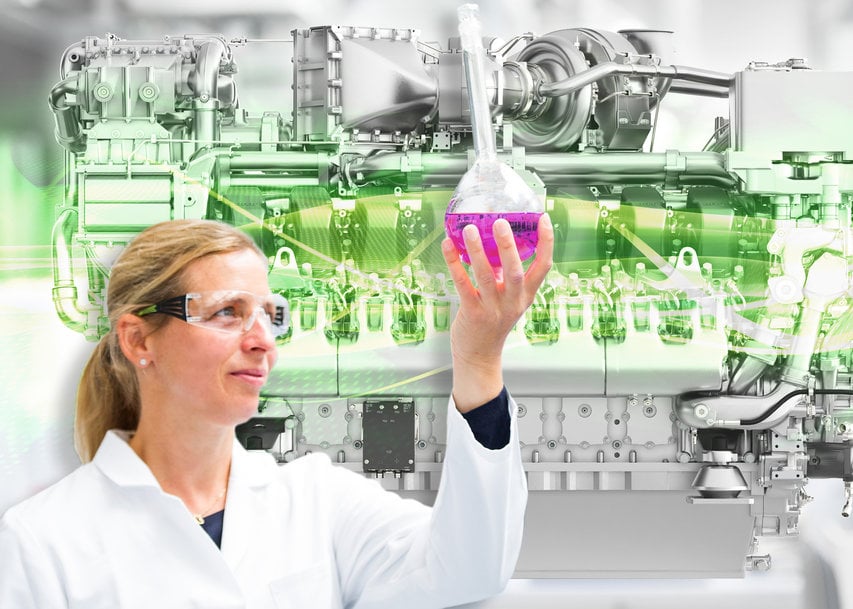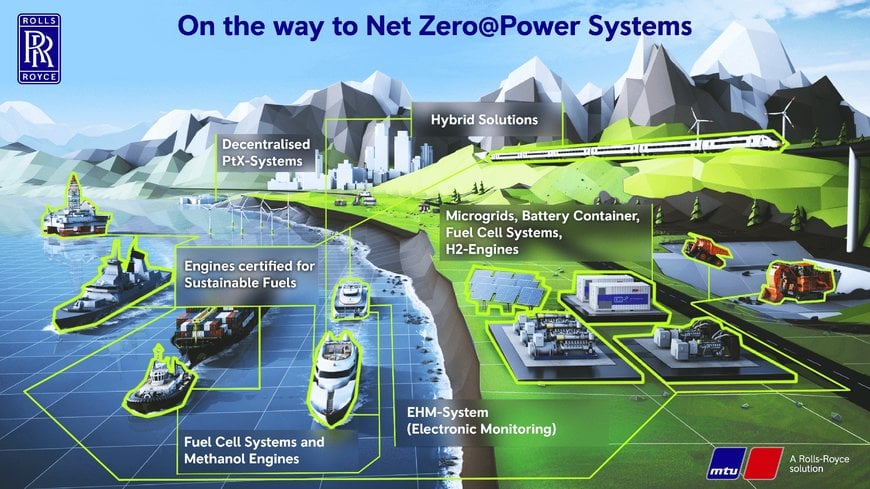Rolls-Royce Power Systems sets out road map for climate-neutrality with ‘Net Zero at Power Systems’ - Major reduction in emissions by 2030
Rolls-Royce Power Systems is taking the next step towards a climate-neutral future. By 2030, the Rolls-Royce business unit is to cut greenhouse gas emissions by 35% compared to its 2019 level through the use of new net zero and cero carbon technologies.

- From 2023 key mtu engine series to be ready for sustainable fuels
- From 2025 power generation with CO2-free fuel cells
- By 2030 35% reduction in greenhouse gas emissions at product level
- By 2050 Rolls-Royce Group to become compatible with net zero
- Duty of politics to provide framework and incentives for changeover to sustainable products
This near-term target plays a significant role in Rolls-Royce Group’s ambition to achieve net zero by 2050 at the latest. To accomplish that mission, the role of pioneer goes to Power Systems: “With ‘Net Zero at Power Systems’, we’re not just taking action to protect the environment. We’re re-aligning our strategy towards eco-friendly energy and propulsion systems. We already see these explicitly as growth opportunities for our business in the coming years," says Andreas Schell, CEO of Rolls-Royce Power Systems.
A key element in achieving these goals is the certification of the most important mtu engine products, which will run on sustainable fuels from as early as 2023 and then be successively brought into use. “The certification means that the new generation of Series 2000 and 4000 engines, that currently account for 85% of our sales revenues, will be qualified to run on second-generation bio-fuels and on E-fuels,” explained Dr Otto Preiss, Chief Technology Officer and COO of Rolls-Royce Power Systems. The engines are used in a wide variety of applications, for example, in energy supply, commercial shipping, heavy land vehicles, passenger trains and in yachts.
Power Systems is taking a multi-pillar approach to reducing emissions: Besides using sustainable fuels, the Rolls-Royce business unit is also building on new technologies such as CO2-free fuel cell systems. From 2025, these will be used in power generation solutions – from balancing energy for compensating fluctuations in the public grid to continuous power and the provision of emergency power in, for example, hospitals and data centers. On top of that, development engineers are also working on engines powered by hydrogen and methanol as well as on concepts for decentralized Power-to-X systems. Other sustainable solutions such as battery energy storage systems, hybrid propulsion systems for marine and rail applications and microgrids already feature in the Power Systems portfolio for decentralized, environment-friendly power solutions.

Tackling the biggest sources of emissions first
“To make as big an impact as possible in the fight against climate change, the first priority of Power Systems is to re-align its product portfolio towards sustainability. That’s the area we’re concentrating on at present because that’s where we see the biggest potential for cutting greenhouse gas emissions. But this year will also see us setting milestones for gearing our production and value chain to long-term climate neutrality,” explained Dr Otto Preiss.
As a specialist for propulsion and energy solutions, Power Systems is thus setting strong milestones with ‘Net Zero at Power Systems’, which follows on from the Rolls-Royce parent company's ‘Pathway to Net Zero’ programme. In total, the Power Systems products sold in 2019, the year before the pandemic, will generate some 109 million tons of greenhouse gases over their service life in the field – almost double that emitted by the Greater London region every year. “That means that when it comes to lowering emissions, we have a lot of leverage. But the onus is on policy-makers as well to put in place stable framework conditions for sustainable energy solutions in the areas of industry in which we operate, thereby providing clear incentives to participate in the changeover to sustainable products,” said CEO Andreas Schell.
The move towards sustainability began at Rolls-Royce Power Systems some time ago. ‘Net Zero at Power Systems’ is in fact a further development of the ‘Green & Hightech programme’ and as such forms an integral part of the overarching corporate strategy that has been driving the transformation into a provider of integrated sustainable solutions for energy and propulsion since 2015.
www.mtu-solutions.com

